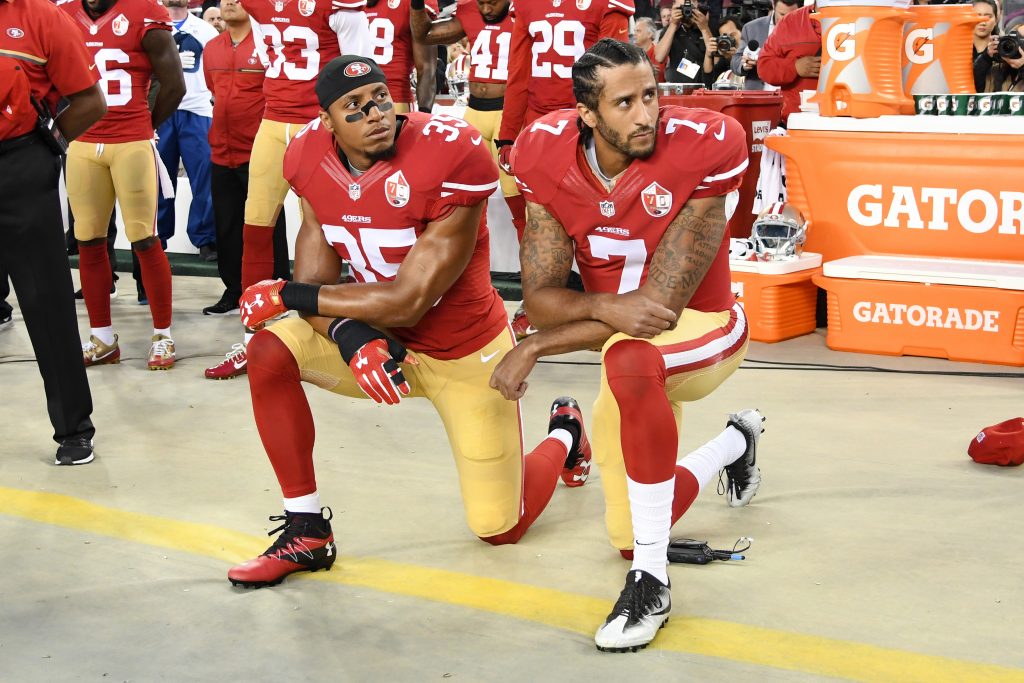
For years, sports have been the unifying force amongst communities, states, countries and the world itself. Regardless of their philosophy in life, many have managed to put those aside and come together as one to root for their favorite teams.
Forward to 2019 and politics, socio-economic activism and even racial division has officially entered the game. The times when athletes, team owners and sports were all separate from what was going on in the world has now faded away. Athletes, owners, athletic franchises and the fans have all stepped up and taken strong stances that have brought politics and activism to the field or court.
In 2016, Colin Kaepernick sat down while the USA’s anthem was played. Kaepernick explained his position stating “I am not going to stand up to show pride in a flag for a country that oppresses black people and people of color. To me, this is bigger than football and it would be selfish on my part to look the other way. There are bodies in the street and people getting paid leave and getting away with murder.”
In 2017, the Golden State Warriors as a team stated they would not be accepting an invitation from the White House. And while they had not officially refused the invitation, before they could, President Trump himself (via twitter) withdrew it: “Going to the White House is considered a great honor for a championship team.Stephen Curry is hesitating, therefore invitation is withdrawn!” (4:45 AM – Sep 23, 2017)
Forward to July 2019 and the conversation of “Equal Pay” took the forefront when the US Women’s Soccer Team won the World Cup in July 2019 giving strength to their voices and highlighting that while the men’s team has not been as successful in wins at the worldwide platform, men outearn their counterparts in women’s soccer by a significant percentage that was as some put it “insulting.”
Add on public rejections of the US President by being booed in Game 5 of the World Series between Houston and the Washington Nationals this past October 28th, 2019 and a UFC event on November 2nd, 2019.
Now granted, the Washington Nationals did accept an invitation to the White House and while somewhat successful, it did come with controversy as their star pitcher Sean Doolittle refused to attend by stating, “There’s a lot of things, policies that I disagree with, but at the end of the day, it has more to do with the divisive rhetoric and the enabling of conspiracy theories and widening the divide in this country”. And, of course, Kurt Suzuki wearing the notorious red cap, a symbol of President Trump and his base. That, to some, is the symbol of regression in race issues, equality and human rights.
My point? Times have changed! While sports have been the one place where we can get along, the current climate of our times in our country has dramatically changed the tone. Some accuse athletes for crossing the line and demand that they stay in their lanes and leave politics to those who know better. Others, in contrast, have applauded the efforts of those athletes who have not only used their platform as a way to denounce certain actions and behaviors by political figures and or laws, but have also put their careers at risk of major backlash.
And while the conversation seems to have taken a strong stance in the last five years, this has been in the works for decades. In 1968 at the World Olympics in Mexico City, Tommie Smith and John Carlos during a running award event raised their black-gloved hands as the U.S. national anthem played. Both were shunned without knowing that they would be by far the last ones to have to do this.
Little did they know, they were protesting the same things Colin Kaepernick would protest today. Please note we are talking about a 51-year gap between events. Perhaps that’s the reason these actions have spilled into sports? I mean, it has been 51 years! “If not now, when?” some would say.
Nonetheless, the question remains: What is too much and what is not enough? What can we or should we expect out of athletes and the organizations they are part of? Are athletes being disrespectful to the office of the US President by not attending or refusing to attend as a team? Or has the environment pushed athletes into a corner leaving them with no choice but to respond by refusing to participate in anything they feel is against their core moral values and beliefs?
What about us fans? What do we do? Do we stop following the teams that fail to act upon an issue that we find disrespectful? Or do we demand more action from those in charge in the sports world by becoming vocal in the middle of a game?
To be honest with you, I am not sure what the right answer here is.
Perhaps with time we will know, but right now, things are pretty cloudy for athletics and politics. And as much as I would like to hope there is an answer that will make sense for all of us, I have a feeling it isn’t as black and white as we would like it to be.
One thing I do know. No matter what, we all know sports will continue to go on. After all, the core value of athletics is to bring people together. Much has been said about the influence sports have to unite people even in the most bitter of times! Let us not forget the British and Germans in 1914 called a cease-fire as history claims they even played soccer around the Christmas season that year.
And while we are not at war, per say, some believe the tensions in our country have become too convoluted to know what exactly is the right thing to do in these days.
Some think it would be irresponsible to keep sports and current events in their own lane. Others believe that with time, as always, sports will find a way to unify all men and women across the globe as they always have from the beginning of times.




